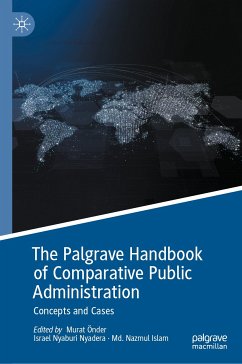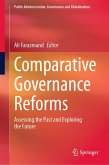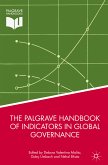The authors bring a fresh and macro level framework to comparative public administration using diverse countries cases are rich and useful in their own right and illustrate the creative comparative approach the authors present. This book is well worth reading! ---Prof. Frances S. Berry, Reubin O'D Askew Eminent Scholar, Florida State University
This book is timely and significant not only because it is being written at the time when globalization has led to increased diversities in our universities but also because the book captures the non-Western public administration system in a unique way.
---Prof. Dr. Yusuf Tekin, Rector, Ankara Haci Bayram Veli University
The authors have taken up the challenge and done an excellent job of rethinking comparative public administration's historical development, conceptual and theoretical framework, comparative methodology, and features of developed and developing countries public administrations and case studies.
The strength of this book lies in its global reach and comparative approaches to understanding and appreciating the complexities, and usefulness of comparative approaches to public administration. It is also a welcome addition to the literature by using the interdependent lenses of socio-cultural, political, religious and institutional dimensions to capture why and how things must preferably be done collectively to achieve the best results.
A brilliant and irresistibly readable book. ---Prof. Emmanuel Kwesi Aning, Director of Research, Kofi Annan International Peacekeeping Training Centre
This handbook discusses different countries' bureaucratic, institutional, constitutional, reforms and governance system. It analyses the legislative and policy ¿making processes and applications, local structures and functions of public administration in a ¿given country. It presents ¿the comparative aspects of public administration across the globe with recent developments in ¿the field.
Murat Önder Professor, Department of Political Science and Public Administration at Ankara Yildirim Beyazit University. He is member of the Turkish Higher Education Quality Council.
Israel Nyaburi Nyadera Lecturer of International Relations, Egerton University and Riara University Kenya.
Md. Nazmul Islam Assistant Professor, Department of Political ¿Science and Public Administration and Head of Turkiye, Asia and Indo-Pacific Studies, ULISA, AYBÜ and Fellow, Faculty of Communication, Ankara University.
This book is timely and significant not only because it is being written at the time when globalization has led to increased diversities in our universities but also because the book captures the non-Western public administration system in a unique way.
---Prof. Dr. Yusuf Tekin, Rector, Ankara Haci Bayram Veli University
The authors have taken up the challenge and done an excellent job of rethinking comparative public administration's historical development, conceptual and theoretical framework, comparative methodology, and features of developed and developing countries public administrations and case studies.
---Prof. Pyeong Jun Yu, Yonsei University and 51st President of Korea Association of Public Administration
The strength of this book lies in its global reach and comparative approaches to understanding and appreciating the complexities, and usefulness of comparative approaches to public administration. It is also a welcome addition to the literature by using the interdependent lenses of socio-cultural, political, religious and institutional dimensions to capture why and how things must preferably be done collectively to achieve the best results.
A brilliant and irresistibly readable book. ---Prof. Emmanuel Kwesi Aning, Director of Research, Kofi Annan International Peacekeeping Training Centre
This handbook discusses different countries' bureaucratic, institutional, constitutional, reforms and governance system. It analyses the legislative and policy ¿making processes and applications, local structures and functions of public administration in a ¿given country. It presents ¿the comparative aspects of public administration across the globe with recent developments in ¿the field.
Murat Önder Professor, Department of Political Science and Public Administration at Ankara Yildirim Beyazit University. He is member of the Turkish Higher Education Quality Council.
Israel Nyaburi Nyadera Lecturer of International Relations, Egerton University and Riara University Kenya.
Md. Nazmul Islam Assistant Professor, Department of Political ¿Science and Public Administration and Head of Turkiye, Asia and Indo-Pacific Studies, ULISA, AYBÜ and Fellow, Faculty of Communication, Ankara University.
Dieser Download kann aus rechtlichen Gründen nur mit Rechnungsadresse in A, B, BG, CY, CZ, D, DK, EW, E, FIN, F, GR, HR, H, IRL, I, LT, L, LR, M, NL, PL, P, R, S, SLO, SK ausgeliefert werden.









